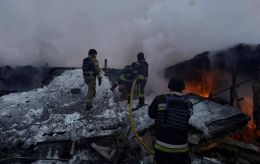Mariupol defender Hlib Stryzhko: Old men in suits with medals are no longer the typical image of veterans
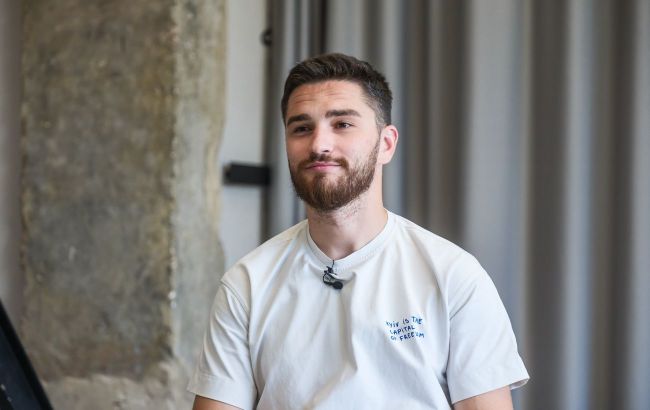 A veteran of the Russian-Ukrainian war, Hlib Stryzhko (Photo: RBC-Ukraine, Vitalii Nosach)
A veteran of the Russian-Ukrainian war, Hlib Stryzhko (Photo: RBC-Ukraine, Vitalii Nosach)
A veteran of the Russian-Ukrainian war, Hlib Stryzhko, who survived captivity after the defense of Mariupol, speaks in an interview with RBC-Ukraine about the challenges of civilian life, the attitude of Ukrainians towards veterans, and what victory and Ukraine's future might look like.
"Semper fidelis – always faithful," is the motto of Ukrainian marines. Hlib Stryzhko, a marine who defended Mariupol at the beginning of Russia's full-scale invasion, remained faithful to his oath and country. On April 12, while on a combat mission at the Illich Iron and Steel Works (literally Mariupol Metallurgical Plant named after Illich), the soldier sustained severe eye injuries and pelvic fractures. To save Stryzhko’s life, along with other wounded soldiers, they were handed over to the Russian side for an exchange with Russian prisoners.
Hlib Stryzhko spent 17 days in captivity, during which he received no medical assistance. After returning to Ukrainian-controlled territory, the marine underwent long-term treatment and rehabilitation. As a result of his injuries, Stryzhko was left with a lifelong disability of Group II at the age of 25, meaning he could not return to a combat position in the military.
RBC-Ukraine interviewed Hlib about his return to civilian life, the image of veterans and marines in Ukrainian society, the problems with veteran policies, and how civilians can properly express their gratitude to military personnel.
– You've been a veteran for more than two years now. What helped you transition back to civilian life?
– My inner strength helped me; it kept me from giving up or complaining. There was a lot of work on myself, on my life’s comfort, to make sure I was satisfied with it. A large amount of effort led to where I am now. This process is ongoing. I live a happy retirement life, and I’m satisfied with its quality.
– You are now the head of Kyiv’s Veteran Hub. Is this a job, a calling, or a way to self-realize?
– Here, I’m less of a veteran and more of a worker. Veteran Hub is a support network for soldiers and their families. It was created in 2018, even before the Ministry of Veterans Affairs. Initially, the Hub was meant to provide service support for veterans of the ATO and OOS. Over time, our activities expanded, and now we focus on three key aspects – working with soldiers, veterans, and their families.
We provide services such as legal consultations, psychological support, managerial guidance, organizing support groups, and more. We also have a research center that conducts studies to make our work more systematic. Additionally, we act as communication managers, bringing narratives to the media that we believe should be present in the country.
One such narrative is the experience of soldiers' families, who have never been recognized as subjects in our state. When relatives call a soldier's wife, they often ask about the husband’s condition, not hers. But she is also going through a very difficult story. We try to highlight such issues.
My role at Veteran Hub is to ensure the Kyiv branch functions smoothly, that employees are comfortable, and that interesting events are held here. In essence, it’s about managing internal processes.
_1.jpg)
Hlib Stryzhko defended Mariupol at the beginning of the full-scale invasion (photo: Vitalii Nosach/RBC-Ukraine)
– What is the image of veterans in our society?
– It's difficult to generalize about the whole society. I don't think there’s a single, formed image. We are moving away from the Soviet image of a veteran – old men in suits with medals. The focus is also shifting to include both male and female veterans. People realize that courage has no gender and that both men and women fight.
For me, the image of veterans must be based on two pillars – dignity and respect. It should be presented through this lens. It’s important to show that beyond military experience, there are many other qualities, and combat experience is not the only defining factor in a person’s life. Someone can be a great warrior but still return to the city and violate traffic rules. But that doesn’t give them a free pass.
Veterans should be viewed holistically because people with combat experience are, first and foremost, people. Sometimes, they do good things, sometimes not-so-good things. I’d like to see different experiences showcased. In this regard, I don’t see much active work from our ministries – neither the Ministry of Veterans Affairs, Culture, nor the Ministry of Defense.
– What needs to change in the Ministry of Veterans Affairs’ policies?
– Since its creation in 2018, the Ministry of Veterans Affairs has lacked systematic policy. Several people have already held the position of minister. There’s no plan for where we should be by 2030 or 2035. It’s all just piecemeal efforts. Being more flexible, the public sector can often do this work more efficiently.
– Veterans often complain about the benefits system. What’s your take?
– The only benefit I use is the one for public transportation. All the others are inconvenient for me. As a person with a disability, I have the option of not paying for utilities during the duration of combat operations. But I find this mechanism ineffective. Am I willing to fight for those few thousand hryvnias, wait in lines, and undermine my dignity? No. However, the state is not interested in simplifying these mechanisms.
I try to use municipal transport or ride a scooter to avoid hearing that the preferential seats on buses are already taken. My dignity isn’t worth the 15-hryvnia fare. I don’t want to feel anxious about getting on a bus.
While you’re a serviceman, you’re needed by the state, but once you become a veteran, you suddenly stop being needed. This is a sad trend, and I hope it changes.
.jpg)
Hlib became a veteran at the age of 25 (photo: Vitalii Nosach/RBC-Ukraine)
– How does this lack of need manifest itself?
– In the absence of quality services and ease of access to them. I’m a veteran with injuries that are hidden under my clothes, I walk on my own two feet, and I have all four limbs. I have enough patience to visit government offices, wait in lines, and monotonously explain why I’m there when asked at the Pension Fund, “Have you seen yourself? Why do you need a pension certificate?”
Instead of making services more accessible, the state provides a veteran assistant who will explain how to navigate these inconvenient services. The state says, "You’re incapable of doing this." But what if I were in a wheelchair, living in a non-inclusive housing complex, and found it difficult to leave my apartment without assistance because there are too many curbs? Instead of handling it online, I must visit inaccessible administrative centers, pension funds, and social protection departments to process my benefits.
Why can’t there be a quality service where I can do everything online without interacting with people who pass judgment? And I’m talking about Kyiv – things are even worse in small towns.
– Is there any international experience we should adopt?
– No. We can look at how things were done in Denmark, the US, or Croatia, but we must develop our own experience. Given that we’ve been at war for 10 years, our experience is already interesting to other countries.
– From your observations, how tolerant is our society towards people with disabilities?
– I don’t want to assess the entire society, as it consists of over 30 million people. When I had to undergo a second round of medical examinations for disability certification, I had to explain to every doctor why I was there. It’s not a very human-centered approach. Why can’t I be treated well just because I’m a person, not for any specific merit?
– From American films, we know a lot about the image of their marines. What is the image of a Ukrainian marine?
– There’s no public image, a communications challenge for the Marine Corps. However, within the Corps itself, it’s well-defined. When someone joins, there’s a clear understanding of what a Ukrainian marine should be. A significant role was played by Father Andriy Zelinsky, who once served as the chaplain of the 36th Brigade. In my opinion, he is the best example of a chaplain in Ukraine because, when he joined the Marines, he understood that to be closer to the soldiers, he had to go through the same stages. He started serving and earned the right to wear the Marine’s assault beret.
All his conversations with sailors, sergeants, and officers were collected into his book, "The Ethos of a Marine." It describes the continuity of generations of marines in Ukraine. After all, the Cossacks, who sailed down the Dnipro on their Chaikas (Seagull) and stormed the Crimean shores, performed amphibious operations like marines do today.
Because our media coverage is not as strong, the image of a marine remains a mystery for many Ukrainians. In simple terms, a marine is a warrior of three elements. On land, in the air, and at sea, they must carry out combat missions. We were taught to storm the shore from the sea, run across fields, storm enemy trenches, jump out of helicopters with weapons and parachutes, and then carry out missions. We are the army’s amphibious arms, universal fighters.
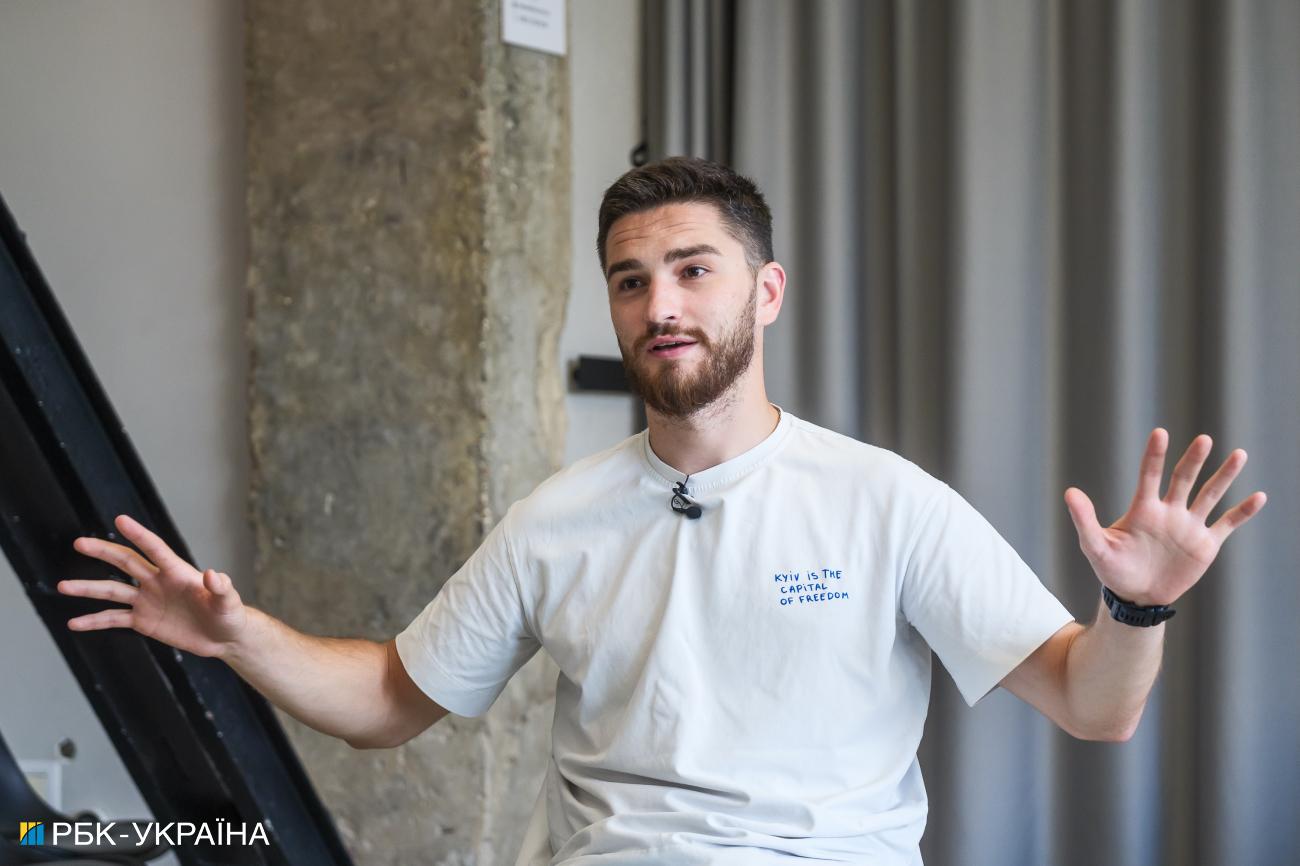
Hlib spent 17 days in Russian captivity in April of 2012 (photo: Vitalii Nosach/RBC-Ukraine)
– You were a defender of Mariupol. Were you able to complete your tasks, and what were they?
– The order was simple–not letting the enemy break into Mariupol. Given the forces and resources we had, we managed to carry out the order.
– Does it upset you that when people mention Mariupol, they talk about Azovstal and rarely about the Illich Plant, where the marines were stationed?
– Have I ever encountered someone saying, "Oh, you were at Azovstal" when I mentioned I was in Mariupol? Of course. Does it anger me? No. I am quite tolerant of people's ignorance because I, too, can be ignorant in some matters.
– Almost your entire unit was killed in Mariupol, and those who survived were captured. Are any of your comrades now back in Ukraine?
– Six people from my company were returned from captivity, and they continue to serve. One of them was killed in November 2023 during the assault on Krynky. The others, both men and women, continue to serve. I stay in touch with them.
– What was the hardest part of captivity for you?
– Probably the uncertainty about what would happen next. I didn’t care anymore; my body was broken, and I was in pain. But suffering wouldn’t change anything. What helped me hold on was my faith in God and the Marine Corps. Every marine takes an oath stating: I will be a faithful defender of Ukraine on land, at sea, and in the air. The marine corps motto is "Semper fidelis," which means "Always faithful" in Latin. So, did I have the right to complain or give up? No, because I had an order. And that’s what helped me hold on. If I was alive, that meant I still had work to do; it was too early to rest.
– How should civilians properly show respect to soldiers and veterans when they strongly feel the need to thank them?
– It’s important to respect the other person, no matter how strong your sense of gratitude is. Veteran Hub once created a grand gesture, "Thanks to you" – placing a hand over the heart. Our society doesn’t have a culture of small talk or smiling at each other in the street. This gesture is great because it doesn’t require a verbal response or invade personal space. You simply place your hand over your heart, nod your head, and make eye contact. You can add, "Thank you for your service."
You never know what role a person in uniform holds in the military unless they are a friend or relative. They could be squad commanders, drivers, mechanics, clerks, or lawyers. Each role is important in its way. And when you approach a lawyer in the military and say, "Thank you for your heroic deeds, for saving Ukraine! You are a hero of Ukraine!" it might make them uncomfortable. It’s better to say, "Thank you for your service," because that person is sacrificing part of their freedom and life for the military.
If you feel a strong urge to thank someone, be prepared for them to say nothing in return. And that’s okay.
– What behavior from civilians irritates you?
– I’m not a judge to evaluate civilians' behavior. If it crosses my boundaries, I can mention it. The Russian language irritates me. When I go to a place to eat, and people at the next table speak Russian, I might lose my appetite or clash with them or choose to ignore it. If it’s something more serious, I will react.
I don’t like how civilians park their cars on sidewalks. Sometimes, I carry a tape measure with me to measure the distance because traffic rules state that there should be two meters of space for people to walk freely on the sidewalk. What bothers me more than incorrect parking is the disregard for the law. People know it’s wrong, but do it anyway. That’s not the kind of society I want to live in. These are offenders who aren’t punished because no one cares, and everyone accepts this reality.
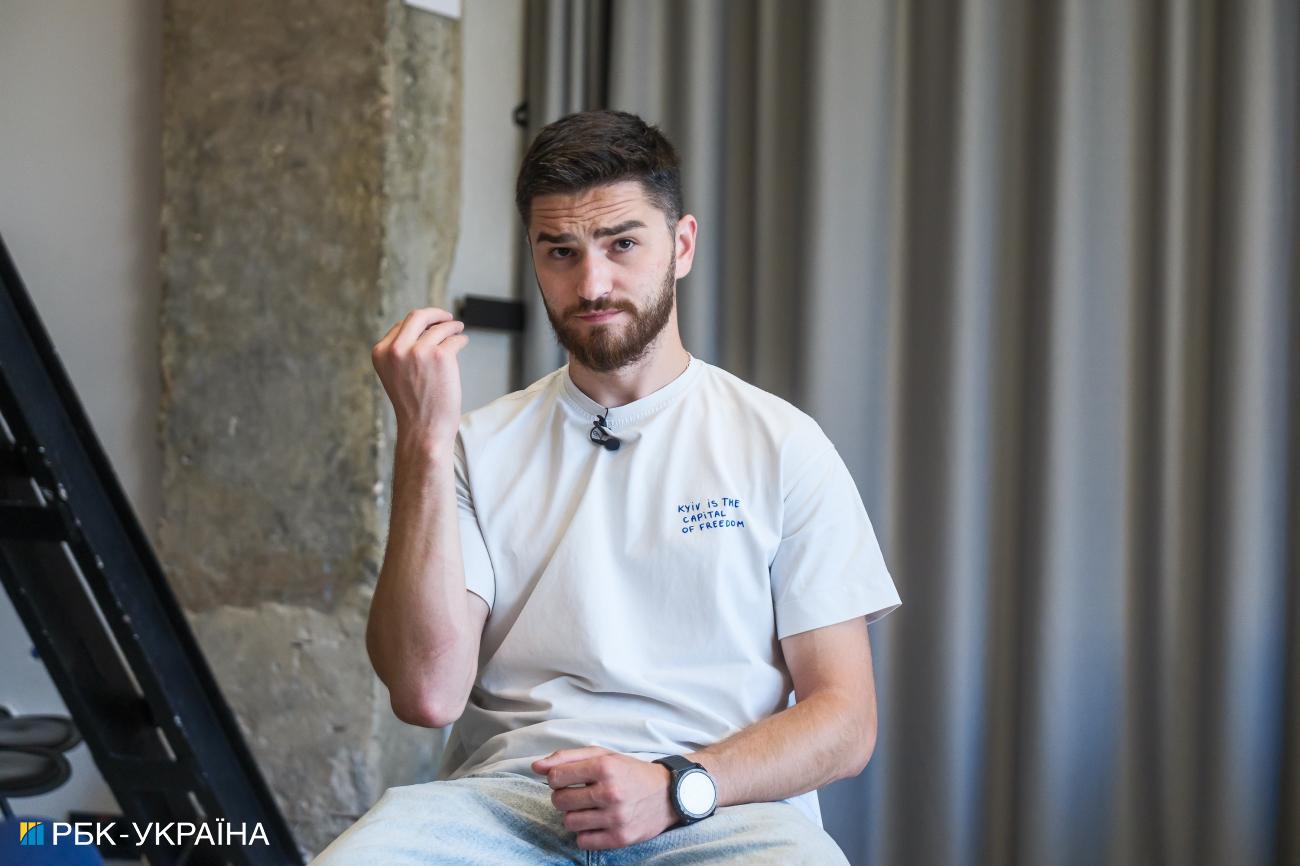
Hlib now heads the Kyiv branch of the Veteran Hub (photo: Vitalii Nosach/RBC-Ukraine)
– By doing this, you reinforce society’s expectation that the guys from the front will return and restore order. Why do you think civilians shift responsibility for the state onto veterans and soldiers?
– It’s a reluctance to take responsibility because we are a childish society. Historically, societies had initiation rites, like sending someone into the woods with a spear for three days to return wearing a bear's skin. Now, most parents might send their child to another city for education. So, we have a childish society that is not ready to take responsibility for itself or the state. An active minority sets the direction, but the passive majority determines the speed of this movement.
– How long do you think it will take for us to grow up? In your view, we aren’t even at the adolescent stage?
– When people in the country can’t connect their listening to Russian music or watching Russian films to the fact that Russian missiles are flying at them, what adolescence are we talking about?
When we look at society as a whole and not just individuals, we already have mentally old people and children. And they don’t take responsibility for their own lives, which then reflects on the country. People can’t adapt to the idea that all work should be paid for and continue to use Torrent or still watch movies on UaKino instead of earning enough to pay for services like Megogo or Netflix. Looking at these specific examples, we are poor, foolish, and immature.
– If we are now at a childish level, how many more years must pass to become a mature society? And can the metamorphosis of war speed up this process?
– We can’t skip evolution. I hope that in about 200 years we’ll be mature, provided no one conquers us and we develop steadily as a country and society.
As for whether the war can speed up the process, think back to May 2022, when it was shameful to speak Russian or use Russian content, and then take a walk around Podil or Maidan today. Just stand silently for 15 minutes without headphones and listen to how people talk and what they talk about.
– What does Ukraine’s Independence mean to you?
– For me, the Independence of my state means that I identify myself as a Ukrainian. Because if my state ceases to exist, then who will I be? Even when I imagined different scenarios while in captivity like being released in five or ten years and finding my country no longer existed, I asked myself, "Who am I?" Right now, I can clearly say I’m Ukrainian, which will always be true. But if my country didn’t exist, I wouldn’t know how to answer. So, for me, Independence is super important.
– As a person with combat experience, how do you feel about mobilization? Should it be compulsory?
– It even sounds strange to phrase it that way. We need to wake up a little. The country is in danger. People should at least be prepared. They need to give themselves a clear answer: What will I do if Kyiv is surrounded again? If someone is scared, they need to work on that. There’s this misconception that if you show up at the TCC today, you’ll be in the trenches tomorrow. If you’re a specialist in a particular field, you’ll likely remain a specialist in that field in the military.
Why should I worry if someone is afraid? I’m doing everything I can to ensure this country exists. I don’t feel responsible for nagging people: "Please, speak Ukrainian, don’t let your children watch Russian cartoons, go get prepared, find out what a tourniquet is." That’s not my responsibility. It’s that person’s responsibility. And when they die, I won’t feel sentimental; I’ll just be a little sad that there’s one less Ukrainian.
In Mariupol, I was super happy to be with my guys from the airborne assault company of the first battalion, who were aged 19 to 23. I had an experienced commander whose experience saved my life. His order to dig me out is the reason I’m alive today. Not everyone is ready to take responsibility.
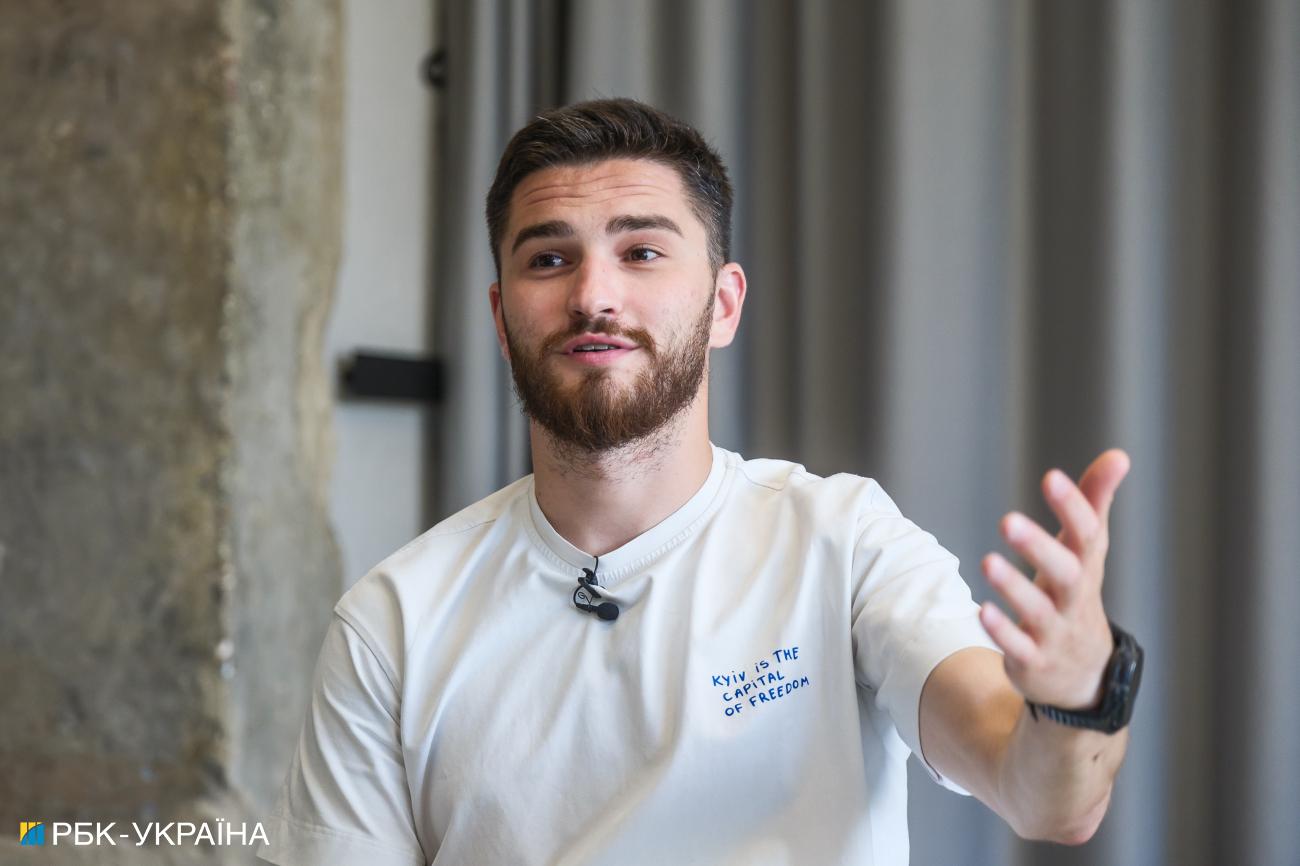
"We have a childish society that is not ready to take responsibility for itself or the state", says Hlib Stryzhko (photo: Vitalii Nosach/RBC-Ukraine)
– How do you explain the differing perspectives on mobilization between the state and the military, especially regarding economic exemptions?
– There’s no communication from the state. There are no honest answers to questions like, if one part of the population is currently serving, when will they be replaced? This causes some anger among servicemen and their families. When a woman whose husband is serving walks in the park with her child and sees a family where the husband, wife, and child are together, she wonders why that woman gets to be happy with her husband while she does not. The lack of honest communication builds up negativity.
– Now, there’s a lot of talk about "just peace" instead of victory. What do you think about that?
– Every war ends with the signing of agreements, whether victorious or not. Every armed conflict has ended this way, either temporarily or permanently. The question is, on what terms and in what format will the documents be signed? The same thing happened in February 2015 with the Minsk agreements after Ilovaisk and Debaltseve – documents were signed, with both sides taking obligations. We may see something similar in the future.
– What kind of Ukraine would you like to see after victory?
– A grown-up one. I’d like to see people take responsibility for their actions and words. If the percentage of responsible people in society rises to at least a quarter of the population, I’ll be satisfied with that result.
